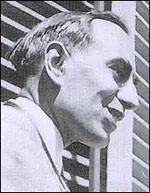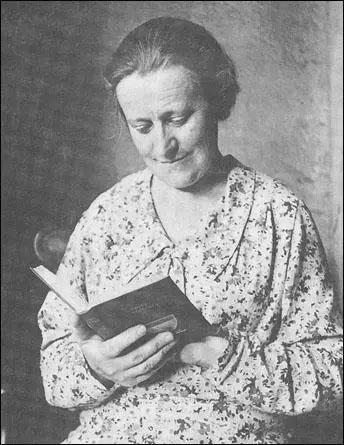John Robert Peryer

John Robert Peryer, the son of George J. Peryer and Sarah Ann Peryer, was born in Camberwell, London, on 3rd September, 1891. His father was a cigar maker and journeyman and his mother was the daughter of a local baker and sub postmaster. Peryer's parents were both refugees. (1)
Peryer was awarded at scholarship to attend Alleyn's School in September 1910. During his time at the school, he showed a particular talent for learning languages. In 1916 Peryer was awarded a place at university. However, it was during the First World War and instead joined the 16th Battalion London Regiment (Queen's Westminster Rifles), at the age of 17. The following year he was recommended for Officer Cadet Training. In September 1917 he received the rank of 2nd Lieutenant. After gaining his commission, John was posted to 21st Battalion (1st Surrey Rifles) and received orders to go overseas to the Western Front. After arriving in France he was transferred to 4th Battalion (Royal Fusiliers).
In 1918 Peryer was involved in defeating the German Spring Offensive. As a talented linguist he acted as an intelligence officer during operations, liaising with the French and British Military Command. In April 1919 he was recommended for the Military Cross for this work. He also received the Croix de Guerre, a military decoration awarded by France to servicemen who distinguished themselves by acts of heroism when in combat with enemy forces.
After the end of war, Peryer returned to England and was officially discharged from the Army in April 1919. He quickly returned to his studies and completed his education at the London University in 1923, gaining a Bachelor of Science degree with honours in Mathematics as well as Teaching Diploma. Shortly after receiving his degree, John married Harriet Marie Raxworthy. (2)
John Peryer taught at Lymm Grammar School before moving to Worthing where John became Senior Mathematics Master at Worthing High School for Boys. He lived at Allendyne, 24 Offington Gardens. Along with Charles Barber, Worthing's first Labour Party councillor, and his wife, Marion Barber he established the International Friendship League, an organisation attempting to "foster peace and harmony between groups of young people from a spectrum of European nations." (3)

At an election meeting in Broadwater on 16th October 1933, Charles Bentinck Budd revealed he had recently met Sir Oswald Mosley and had been convinced by his political arguments and was now a member of the British Union of Fascists (BUF). Budd added that if he was elected to the local council "you will probably see me walking about in a black shirt". (4)
Budd won the contest and the national press reported that Worthing was the first town in the country to elect a Fascist councillor. Worthing was now described as the "Munich of the South". A few days later Mosley announced that Budd was the BUF Administration Officer for Sussex. Budd also caused uproar by wearing his black shirt to council meetings. (5)
On 4th January, 1934, Budd reported that over 150 people in Worthing had joined the British Union of Fascists. Some of the new members were former communists but the greatest intake had come from increasingly disaffected Conservatives. The Weekly Fascist News described the growth in membership as "phenomenal" as a few months ago members could be counted on one's fingers, and now "hundreds of young men and women -.together with the many leading citizens of the town - now participated in its activities". (6)
A Worthing Anti-Fascist Committee was established in the town. John Robert Peryer became one of the leaders of the group. (7) Peryer had support from the monthly Worthing Journal. In March 1935, it reported with pleasure the resignation of Superintendent Clement Bristow. It was seen by many as a consequence of his apparent sympathy for the fascist cause, for in court he had described fascists in the town as "very nice Worthing people". (8) A few months later it reported: "Fascism has come to Worthing, but Worthing has shown through its accredited representatives that it is not yet ready to submit to a Dictatorship." (9)
Peryer, who continued to teach at Worthing High School for Boys until his retirement in 1961. He continued to be interested in local history and in 1983, he recorded an oral history interview which reflected on his personal war experience, and life in Worthing in a project run by West Sussex County Council Library Service. (10)
John Robert Peryer died at the age of 92 on the 8th April 1989.
Primary Sources
(1) Biography of John Robert Peryer produced by Alleyn's School (2017)
John Robert Peryer was born in Camberwell on September 3rd 1891 to George J. Peryer and Sarah Ann Peryer. His father was a cigar maker and journeyman and his mother was the daughter of a local baker and sub postmaster. During this time, the family lived at 77 Bellenden Rd, a short distance away from Bellenden Road School where John was first educated. After showing good potential, John was awarded at scholarship to attend Alleyn's School in September 1910. John was awarded this fee exemption for the whole of his school career and consistently maintained a high standard of work. This saw him receive two prizes in 1913, one for Physics and the other for the Canon Carver Junior French Prize. During his time at the school, John showed a particular talent for learning languages which would later be put to good use during his military career. As well as excelling in his academic studies, John was also a member of the Alleyn's Combined Cadet Force where he earned the rank of Lance Corporal.
With such a desire to succeed, John was naturally favoured by his teachers. A year after joining Alleyn's, he was first in his form and was labelled as an 'exceptional boy' in his 1911 End of Term Report. His work and conduct were always regarded as 'excellent' and he was known by all as an intelligent and hardworking individual. By 1916, John had matriculated for the University of London with distinction and looked to continue his academic studies. However, with the First World War showing no sign of being the short war that many had imagined, John delayed his pursuit of further education in favour of signing up to the war effort and carrying out his duty. After being found fit for service, he joined the 16th Battalion London Regiment (Queen's Westminster Rifles) as a Private on June 16th 1916, at the age of 17. Given John's background with the CCF and his ability to speak both French and German, he quickly proved himself to be a reliable soldier, capable of leading men in battle. As a result, he was promoted to Lance Corporal and later to Corporal in 1917. After just a few months in his new role, John had made enough of an impression on his Commanding Officers to be recommended for Officer Cadet Training. He completed this training in September 1917 and received the rank of 2nd Lieutenant at 19 years old. After gaining his commission, John was posted to 21st Battalion (1st Surrey Rifles) and received orders to go overseas to the Western Front. After arriving in France with the battalion, he was transferred again, this time to 4th Battalion (Royal Fusiliers) who were in desperate need of recruits to replace their losses.
(2) John Simkin, Worthing Herald (6th September, 2014)
John Robert Peryer, of Allendyne, 24 Offington Gardens, a maths teacher at the Worthing High School for Boys, became one of the leaders of the anti-fascist movement in Worthing. Along with Marion Barber, he established the International Friendship League, an organisation attempting to “foster peace and harmony between groups of young people from a spectrum of European nations.” Peryer’s parents were themselves refugees and, along with his wife, Harriet Peryer, spent their adult life in promoting international friendship.
